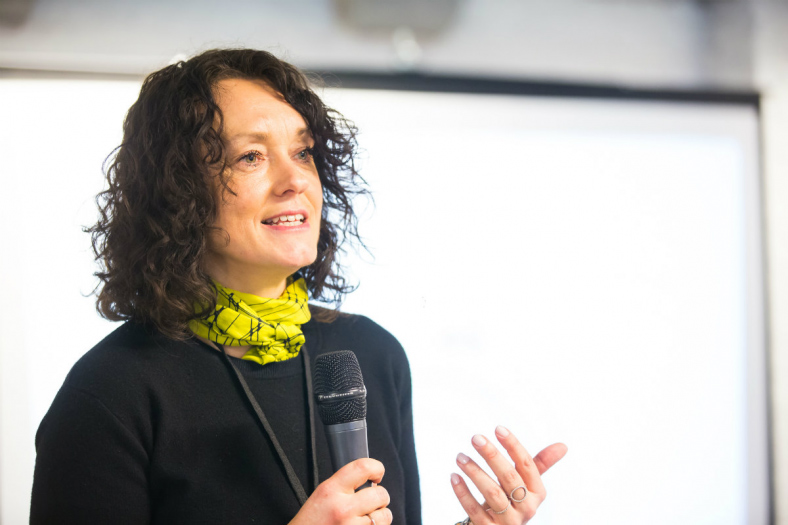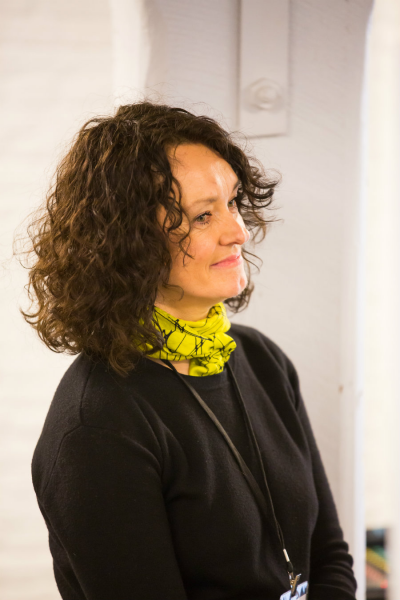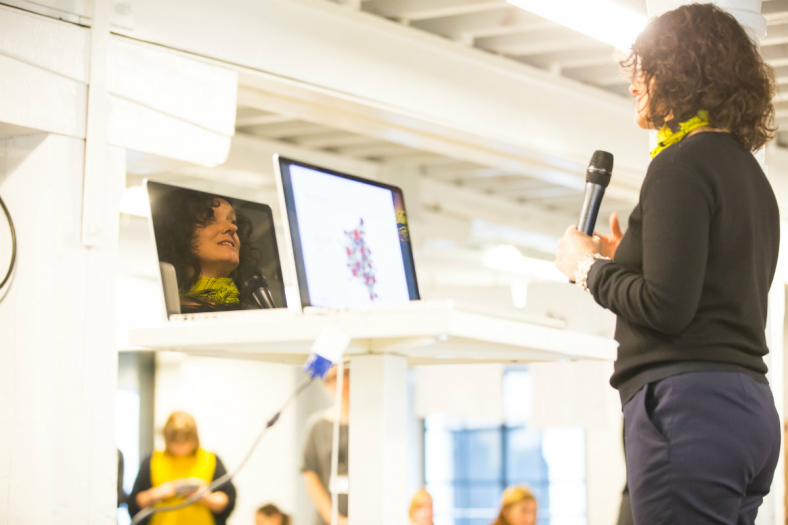Sarah Vandoorne is freelance journalist, eindredacteur en auteur van het boek ‘Kleerkastvasten. De textielketen ontrafeld’ (Uitgeverij Vrijdag, 2023).
Dilys Williams: 'Designers need to challenge the status quo'
‘It is not in the nature of fashion designers to follow the sheep. On the contrary, fashion is about challenging the system.’ Head of the Centre for Sustainable Fashion Dilys Williams is certain of the fact that her colleagues have a lot of power in their hands. ‘But there is still work to do. The current alternatives are simply not enough.’

‘The habit of fashion is a very strong part of society’, Dilys Williams states. ‘That is why it is a very important place to think about sustainability.’
CC Stadslab2050/Fille Roelants Photography
Designers are not necessarily enthusiasts of consumerism. Founder of the Centre of Sustainable Fashion – and current director of the institute – Dilys Williams offers living proof. The city of Antwerp invited her to expand on the idea because of her expertise as a researcher, but also a designer for Katharine Hamnett.
Last month, at a networking event called Fashion Flows, Williams talked about the importance of exchanging ideas and collaborating with different industries in order to demand change. ‘The clothes we wear are part of our identity’, Williams argues. ‘The subject appeals to all of us.’ That is why she uses fashion to open up a debate about sustainability. ‘The garment industry is really the story of David versus Goliath’, she says. ‘Therefore we need to engage in dialogue with those who make our clothes.’
‘Design is a powerful tool’
You talk a lot about how clothes represent someone’s identity. So if someone only wears fair fashion, that is saying a lot about his or her identity?
Dilys Williams: Yes. I think what we wear identifies us, yet we are feeling disconnected. We are wearing things that we do not really know the origins of. We don’t really know what they say and what they mean. It is very easy when you become disconnected from something, to not even think about it. This idea of starting to ask questions and thinking about how we are and what we stand for – and what we stand up for – is a really important discussion.
With our busy lives it is very easy for us to follow the sheep and just do what everybody else is doing. But fashion has never been about doing what everyone else is doing. It has always been about challenging what is going on. So now is the time, probably more than ever, when fashion needs to challenge the status quo.
We have busy lives, but on the other hand buy so many clothes and we keep longing for more…
Dilys Williams: We spend so much time shopping.
As a designer, that must be nice?
Dilys Williams: One of the reasons I went from being a designer to work in academia, was because I thought, are we training designers to design for landfill? What are we actually doing training designers? Are they thinking about what they are doing? Are they thinking about the consequences? Are they thinking about how powerful they are? Because design is such a powerful tool. So, if designers start to ask different questions, maybe we can start to change the aesthetics, the culture.
‘We are up against the current system.’
On the one hand we can tell people about climate change. The climate science behind it is pretty much unequivocal. 97 percent or 98 percent of climate scientists know that climate change is going to affect all of us. So it’s not that we don’t know, but to change culture, we need to change our design process and our habits.
The habit of fashion is a very strong part of society. That is why, for me, it seems like a very important place to think about sustainability. We are nonetheless up against a big juggernaut of the current system: it’s not just the fashion industry, it is the political situation and the whole economic premise of how we do business, the power imbalance.
The power of networks
If that is the case, how can designers challenge the current system?

‘It’s not that we don’t know that climate change is real.’
CC Stadslab2050/Fille Roelants Photography
Dilys Williams: I think it has to be a tapestry things, part of which are the designers making a difference. It is also about us – people who purchase fashion – purchasing differently. Other than that, it is about government legislating a particular point that really helps to make a big shift.
Also, it is about the businesses. A lot of big businesses know that the way that they are doing business is not going to work in the future, but they are tantalized by the fact that they are still making money now.
Big businesses are people, and a lot of people in those businesses know that what they are doing is not a good way of doing business. But it’s very difficult to be bold enough to say, ‘We’re making lots of money, but let’s stop doing that, we are going to have a transition period where we might not make any money and then we are going to be sustainable and that’s going to work’. It does not work like that.
Nonetheless, we are starting to see some bold leadership now. For me, what’s exciting is seeing things on the fringe, like today at Fashion Flows. Things like this, where designers are using their own ethics and integrity to offer alternatives, are happening all over the world.
The power of networks can, hopefully, create a sea change. That is probably an easier way to change things than to make big businesses shift, which will take longer.
Quiet revolution
What I am seeing here today, at Fashion Flows, is a huge amount of people interested in fair and sustainable fashion. Do you think this is part of a global trend, where consumers are really aware and try to make a difference?
‘All the alternatives are lovely, but they are not infiltrating the status quo.’
Dilys Williams: I would love to say yes but the facts show us that it is not changing enough. At the moment, the fashion industry is actually contributing more to problems that it is contributing to solutions. Overall, while I think it is starting to take a deeper root, it is not a global trend.
I think we really need to step up. All the alternatives are lovely, but they are not infiltrating the status quo. Fashion should be about challenging that. So we do need very visible designers, but also, we need businesses. We need change on many different levels simultaneously.
Seven or eight years ago, they asked me to give a lecture, just like the one today. I wanted to talk about examples of change, but I only had two or three in mind. Today, I ran out of time talking about examples. That has to show that there is really a significant change? From the amount of interest that we get from doing our work around the world, yes, I think it’s a quiet revolution.

Dilys Williams as keynote speaker on Fashion Flows: ‘I ran out of time talking about examples. That has to show that there is really a significant change?’
CC Stadslab2050/Fille Roelants Photography
Sustainable fashion and fair fashion
Do you think it’s really possible to have a piece of clothing that is completely sustainable, from the cotton to the confection and the retailing?
Dilys Williams: I think sustainability is not a fixed term, a fixed place, and a material or a product is not sustainable by itself. What makes it sustainable, is how it is made, how someone is taking care of it, how it’s loved, and what happens to it when it no longer has a useful purpose. Sustainability is a process; it is about how we live our lives. So I think the idea of sustainability is a moving term.
Can a product truly be ‘fair’?
Dilys Williams: It can definitely be fair, yes. To me, the ethical consideration of the manufacturer of something is quite different from thinking about sustainability as a holistic notion.
‘Sustainability and fairness are two completely different things. Clothing can definitely be fair.’
Also, I think the equitable contribution and reward for the people involved in creating something and using it, is possible. But our political systems make it very difficult at the moment. Our fashion industry pervades so many geographical locations, and is controlled by so many different governments. The issue of inequality should be brought to the fore, and it is really far more easy to do through something like fashion.
Rana Plaza, for example, really created awareness, because suddenly, it became a very personal thing: ‘Am I wearing something that caused someone else to die?’ It is a very emotive subject.
Unfortunately it does not stay emotive for long. Rana Plaza is not the first time that people have died making fashion. Unless we have a political system where you can be heard, where you can bargain collectively through unions, and until we have countries who have got accountability – and where corruption does not overtake accountability – we just have to keep striving for that.

‘Businesses start out with all good intentions, but when they receive large orders and realise their production is not enoug, they will start considering outsourcing.’
CC Stadslab2050/Fille Roelants Photography
Multiply your good intentions
If a clothing company actively chooses to produce fair fashion, what does the company need to do to achieve that goal?
Dilys Williams: It is the biggest myth that people think there is a check list of how to do it. What you have to do is create your own check list within your own business of issues important to you. And that is not just for companies, it can also be for citizens buying something.
If your check list as a citizen, is ‘Unless I know where it’s from, I’m not going to buy it’, then that is your toolkit. But if your checklist is ‘Do I love it? Is it cheap? And do I know something?’, that is a different checklist and a different mentality.
‘The choices you make as a designer are always going to be a trade-off. It is not about telling somebody that they are better or worse.’
Clothing companies need to ask similar questions. Mostly, businesses start out with all good intentions, values they hold on to, and then suddenly they receive orders and realise their production is not enough. At that moment, they will start considering outsourcing to a place they don’t know. These are tricky decisions.
I myself worked with Katharine Hamnett for a long time. Katharine decided to downscale the business because we weren’t sure of where things were from. We even decided to sanction China because of human rights issues.
How did that turn out?
Dilys Williams: Our collection at that time was mostly silk imported from China. Because of the choices we had made, suddenly we had to cut out a lot of the collection. It was hard. Katharine had to make redundancies and sell her house. But it was her ethic and that was her decision.
It is always going to be a trade-off, you are never going to do the perfect thing. Well, her trade-off was, ‘If I want to live by my own ethics, I am going to have to take the hit of the people working in my London studio getting another job, and the people living in China. So, as much as it hurts me, because they are dear to me, I am going to make it hit right here and stay faithful to my integrity.’
Everybody has to make their own ethical choice. It is not about telling somebody that they are better or worse. If you have got five kids to feed and you can’t afford to do that, you have a very ifferent situation. I think everyone has to make their own judgements. But if they do it by thinking about what their ethics are, rather than just being swept away, we will make progress.
If a designer speaks out against human rights issues in China or other low income production countries, do you think it has an effect on the local situation?
Dilys Williams: Being able to measure the difference of your actions is another thing. We are used to measuring income, profit, and even CO₂ emissions. Social currency or culture change are issues that are far more difficult to measure.
But I do think that if you believe it is the right decision, and you make that decision with the best of your knowledge, then you believe it will make a change. Even if you are not influencing anybody else, you yourself are not contributing to something, whether it’s a regime or other ethics, then that has to make it a positive difference. And if anybody else follows you and decides, ‘I hear what she is saying, I’m not going to do that either’, then you’ve multiplied it.
Maak MO* mee mogelijk.
Word proMO* net als 2798 andere lezers en maak MO* mee mogelijk. Zo blijven al onze verhalen gratis online beschikbaar voor iédereen.
Meer verhalen
-
Report
-
Report
-
Report
-
Interview
-
Analysis
-
Report










 Oxfam België
Oxfam België Handicap International
Handicap International